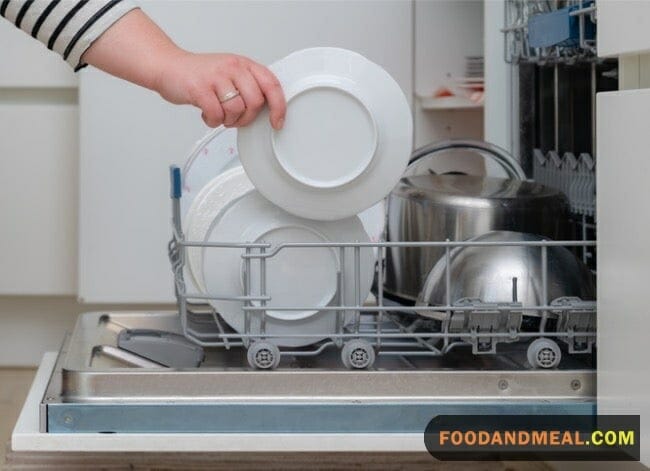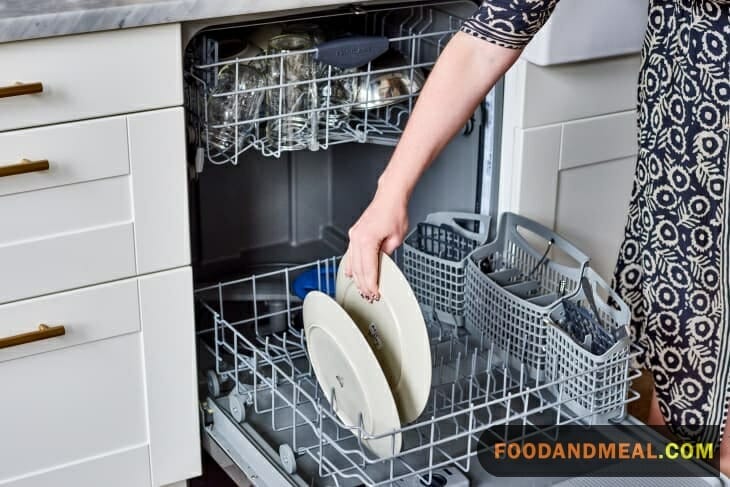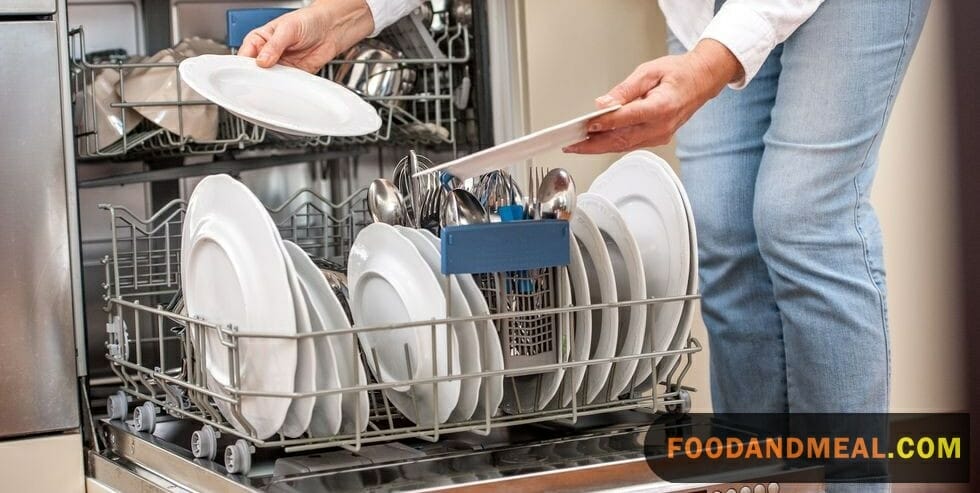Dishwashers have become a contemporary necessity and the ultimate ally in the kitchen. They significantly reduce the time spent with hands in soapy water after meals, a boon for those managing a large family or frequently hosting gatherings.
Nevertheless, like all appliances, dishwashers have a finite lifespan. Regular cleaning is essential, occasional breakdowns may occur, and occasional repairs become necessary. To maximize your dishwasher’s longevity, experts recommend implementing a few minor adjustments that can make a significant impact. However, be attentive to signs of clanking and drainage issues, as they could signal the need for a replacement.
So, How long should a dishwasher last? Below is Food and Meal‘s answer.
How Long Should a Dishwasher Last?
On average, best dishwashers have a lifespan of about 10 years, but some manufacturers boast even longer-lasting models. To assist you in determining when it’s time to upgrade your appliance, consider the following guidelines:
| 10 years |
Bosch, KitchenAid, Maytag, Thermador, Whirlpool, Samsung |
| Over 10 years | Beko, Blomberg, Electrolux, Frigidaire, Kenmore, LG |
| 20 years | Miele |

Several factors play a significant role in influencing the lifespan of a dishwasher:
- Frequency of use: The number of times the dishwasher is cycled per week matters. Those who use their dishwasher less frequently tend to experience fewer repairs and can enjoy a longer-lasting appliance.
- Quality: Investing in a high-quality dishwasher from a reputable manufacturer can extend its lifespan compared to models with lower-quality components. Additionally, opting for a top-tier dishwasher can lead to fewer issues like loud noises and inefficient water usage.
- Maintenance: Regular maintenance, including proper cleaning and care, can significantly impact the longevity of your dishwasher. Neglecting maintenance may result in a shorter lifespan compared to a well-maintained machine.
- Repairs: The choice of repair professionals matters as well. Hiring trained and experienced technicians, as well as using original equipment manufacturer (OEM) parts, can contribute to a longer-lasting dishwasher. Conversely, using aftermarket parts or inexperienced technicians may lead to more frequent breakdowns.
Tips to Maximize the Lifespan of Your Dishwasher

| Keep It Clean | Regularly clean it to maintain efficiency and prevent clogs or breakdowns. Wipe down the door seals and food spills using mild soap and warm water. Every few months, clean the food trap and filter to ensure optimal performance. |
| Use Hot Water | For better cleaning and germ-killing, use hot water in your dishwasher. Both the dishwasher and detergent work more effectively at higher temperatures. |
| Pre-Rinse | Prior to loading, pre-rinse or scrape off large food chunks, especially greasy foods and hard items like bones. This helps prevent blockages and enhances the dishwasher’s cleaning power. |
| Don’t Overfill | Leave enough space between dishes when loading the dishwasher to avoid unnecessary strain. Refer to the owner’s manual for proper loading techniques to optimize each cleaning cycle. |
| Air-Dry Your Dishes | When time allows, opt for air-drying instead of using the dishwasher’s heat cycle. This saves energy and reduces strain on the appliance. |
| Be Selective | While dishwashers can clean more than just dishes, be cautious about placing items that could potentially damage the unit. Ensure the dishwasher is suitable for the specific items before washing them. |
How Do I Know When It’s Time to Replace My Dishwasher?

Regular maintenance can certainly prolong the lifespan of your dishwasher, but there are certain indicators that suggest it may be time to consider getting a new one. Keep an eye out for the following signs:
- Inadequate cleaning or drying performance: If your dishwasher is no longer effectively cleaning dishes or leaving them damp after a cycle, it could be a sign of declining functionality.
- Unusual noises: Humming, banging, or loud noises during operation might indicate mechanical issues that could worsen over time.
- Leaks: Any signs of water leakage around or underneath the dishwasher call for immediate attention, as this can lead to further damage or mold growth.
- Door problems: If the dishwasher door won’t shut properly or keeps popping open during cycles, it may compromise the cleaning process and cause potential hazards.
- Physical damage: Visible signs of rust, cracks, or other structural issues can impair the dishwasher’s performance and pose safety risks.
- Low water pressure: Reduced water pressure inside the dishwasher can result in incomplete cleaning and might be a symptom of underlying problems.
- Drainage issues: Difficulty draining water after a cycle is an indication that the dishwasher’s drainage system may be compromised.
When you observe multiple signs or experience persistent problems with your dishwasher, it’s wise to consider replacing it. Upgrading to a new and more efficient dishwasher can not only improve dishwashing results but also save you from potential repairs and water damage in the future.
Frequently Asked Questions (FAQs) about the Lifespan of Dishwashers:
1. How long is the typical lifespan of a dishwasher?
The average lifespan of a dishwasher is around 10 to 13 years. However, this can vary based on factors such as usage, maintenance, and the quality of the appliance.
2. What factors can affect the lifespan of a dishwasher?
Factors influencing a dishwasher’s lifespan include frequency of use, maintenance practices, water quality, and the brand’s build quality. Regular cleaning and proper care can contribute to a longer lifespan.
3. Does the type of dishwasher detergent impact longevity?
Yes, using the correct dishwasher detergent is crucial. Avoid using harsh or abrasive detergents, as they can damage the internal components and affect the overall lifespan of the dishwasher.
4. Is it worth repairing an older dishwasher or replacing it?
Deciding between repairing or replacing depends on the extent of the damage and the age of the dishwasher. If the repair cost is significant and the appliance is nearing the end of its lifespan, replacement might be more cost-effective.
5. Can regular maintenance extend the life of a dishwasher?
Yes, routine maintenance such as cleaning filters, checking for leaks, and ensuring proper loading can contribute to a longer dishwasher lifespan. Follow the manufacturer’s guidelines for maintenance tasks.
6. What signs indicate that a dishwasher is nearing the end of its life?
Common signs include persistent leaks, unusual noises, ineffective cleaning, and frequent breakdowns. If these issues become frequent and costly to repair, it might be time to consider a replacement.
7. Can hard water affect the lifespan of a dishwasher?
Yes, hard water with high mineral content can contribute to the buildup of scale in the dishwasher’s components. Regularly using a water softener or descaling agent can help mitigate this issue and extend the appliance’s lifespan.
8. Are there specific dishwasher brands known for longer lifespans?
The lifespan of a dishwasher can vary by brand and model. Generally, reputable brands with a history of producing reliable appliances tend to offer dishwashers with longer lifespans. Researching customer reviews and ratings can provide insights.
9. What should I do if my dishwasher is still under warranty but experiencing issues?
If your dishwasher is under warranty and experiencing problems, contact the manufacturer or the authorized service provider immediately. Attempting to repair it yourself may void the warranty.

15 December ·
The Dishwasher Discovery: From Maintenance to Replacement
By Food And Meal
Welcome to another informative episode of Food and meal! In today's discussion, we're diving into the world of dishwashers – those modern marvels that have become essential allies in our kitchens. We all know how dishwashers save us time and effort after meals, especially when managing a bustling household. However, like any appliance, they have a limited lifespan. But don't worry! We've got you covered with expert tips to maximize your dishwasher's longevity and know when it's time for a replacement. So, let's jump right in!



